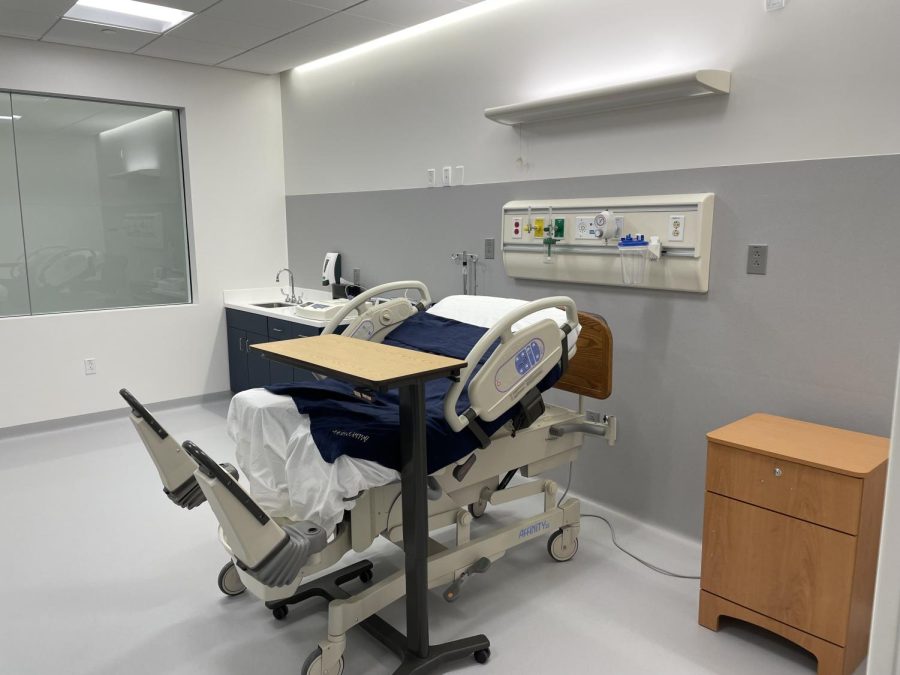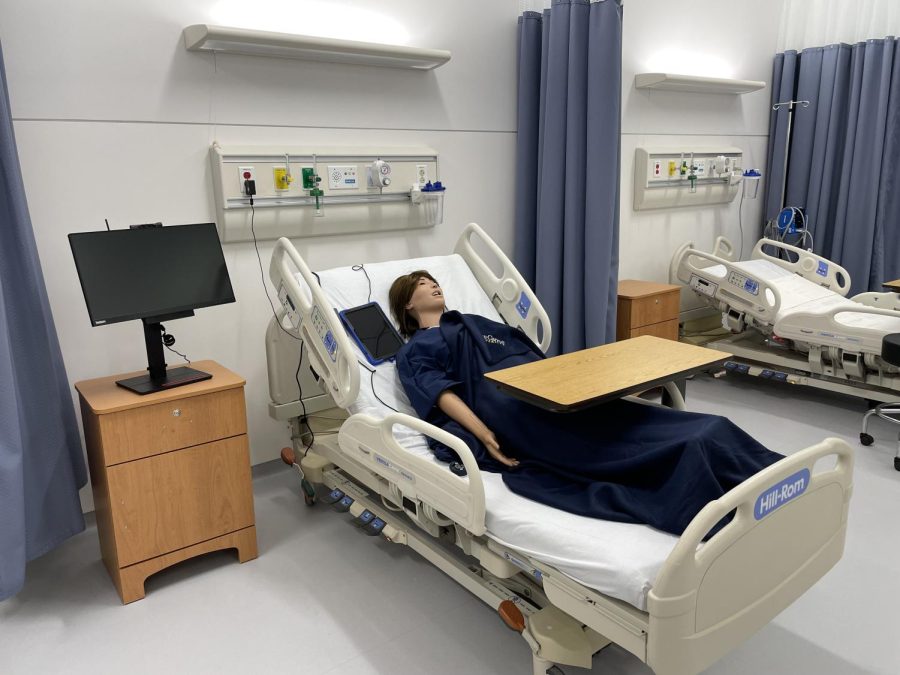A look inside the JCU Bachelor of Science in Nursing
The high fidelity lab located on the second floor of the Dolan Center for Science and Technology has two beds that will be used for patient care training
Mar 30, 2023
In early October, JCU announced the approval of its very own Bachelor of Science in Nursing (BSN) program. This program, which joins the Frances Payne Bolton School of Nursing at Case Western Reserve University and The University of Akron’s School of Nursing as nursing programs in the area, will start classes in Fall 2023.
According to the John Carroll University website, “The nursing workforce is projected to grow by 12% by 2028, according to the American Association of Colleges of Nursing. The AACN data also indicates that one million nurses will retire in 2030, creating 200,000 Registered Nurse (RN) positions each year. Regional hospitals in Northeast Ohio are reporting 4,500 open positions in healthcare, with a particularly acute shortage of nurses.” With the data suggesting a wide increase in nursing positions, the decision to add this program to JCU was a logical choice.
In a prior TCN article, Mike Scanlon ‘06, Associate Vice President of Marketing and Communications, stated that the program will be targeting 60 students a year, but that the actual capacity for the program would be around 100 students per year. The main goal of the program is for these select students to fill the void that currently exists within the field of nursing after their four years at Carroll.
The inaugural Director of Nursing and Strategic Healthcare Innovation, Dr. Melissa Cole, is one of the main people responsible for the development of the Nursing Program. She has received her Doctor of Nursing Practice from Case Western Reserve University and her work includes serving as the Vice President for Integrated Delivery Operations at University Hospitals, Trauma Program Manager at Tampa General Hospital and Clinical Educator in the neuro ICU at the Cleveland Clinic.
Cole told The Carroll News, “As a direct care provider, you can influence one patient at a time. But I felt like as a teacher, you had a bigger reach to have a bigger influence. And so that’s what kind of drove me into education.”
After teaching at the University of Tampa and Case Western, she told TCN that the opportunity at John Carroll was refreshingly different.
“I don’t think I probably would take an opportunity like this if it was an established nursing program. But as you can see, in my background, I like doing startup work. I like doing innovation disruption and what better way to actually transform the healthcare system than to transform the way we teach and prepare our nurses for the future?”
Another integral figure to the development of JCU’s BSN is John Carroll alumna Dr. Shanna Botos ‘00. Botos has over 20 years of nursing experience and has spent several years at the Cleveland Clinic practicing as an acute care pediatric nurse practitioner in pediatric hospitalist medicine. The opportunity to come back to John Carroll as a faculty member is something that excited Botos.
“When I was a student here, I loved what I learned from the Jesuit values, service leadership. They made me a super well rounded individual and truly I give John Carroll credit for making me the adult that I am and so to put together those Jesuit values with nursing, which, that’s what nursing is, it’s service, it’s connecting to other people. It’s using critical thinking skills. I was a STEM major and that’s exactly what nursing is plugging into here. John Carroll already has a strong STEM program. We’re just bringing the next layer, the next best thing.”
With many other institutions already having established nursing programs, it may seem more challenging to get prospective students on board with such a new curriculum. However, Botos and Cole both agree that the newness of John Carroll’s BSN is not a weakness but a massive strength. According to Botos, “The accrediting bodies, the nursing organizations are looking at what nurses need to be for the future and we’re already doing that. So our program will be doing that from day one where other nursing programs have to get caught up.”
The fundamentals of the curriculum will include telehealth, remote patient monitoring and home care, which are fields that have been exacerbated by the COVID-19 pandemic. The Nursing Program is also partnering with the Boler College of Business and the College of Arts and Sciences to weave entrepreneurial ideals into the nursing curriculum.
“So we’re also working with other disciplines like the communication department to discuss if we have a need and desire for medical Spanish for the foreign language requirement that could be helpful to our nursing students,” said Cole. “We’re having a big conversation about American Sign Language (which) is one of the hardest translating services for us in health care, because you need a video, and they’re not always readily available. If you’ve been in a hospital trying to find a piece of equipment, it can take you an hour so we have students that are proficient in ASL and they would love to continue it and maybe we do ASL for medical professionals.”
With the beginning of the Fall 2023 semester rapidly approaching, Botos and Cole are eager to help transform the next generation of nursing professionals when classes officially begin in the new nursing simulation labs located on the second floor of the Dolan Center for Science and Technology. With time, the definition of a John Carroll nurse will be actualized. Yet, for now, the program has one main goal in mind.
“We want to create the next generation of problem solvers who are going to fix our broken health care system.”














